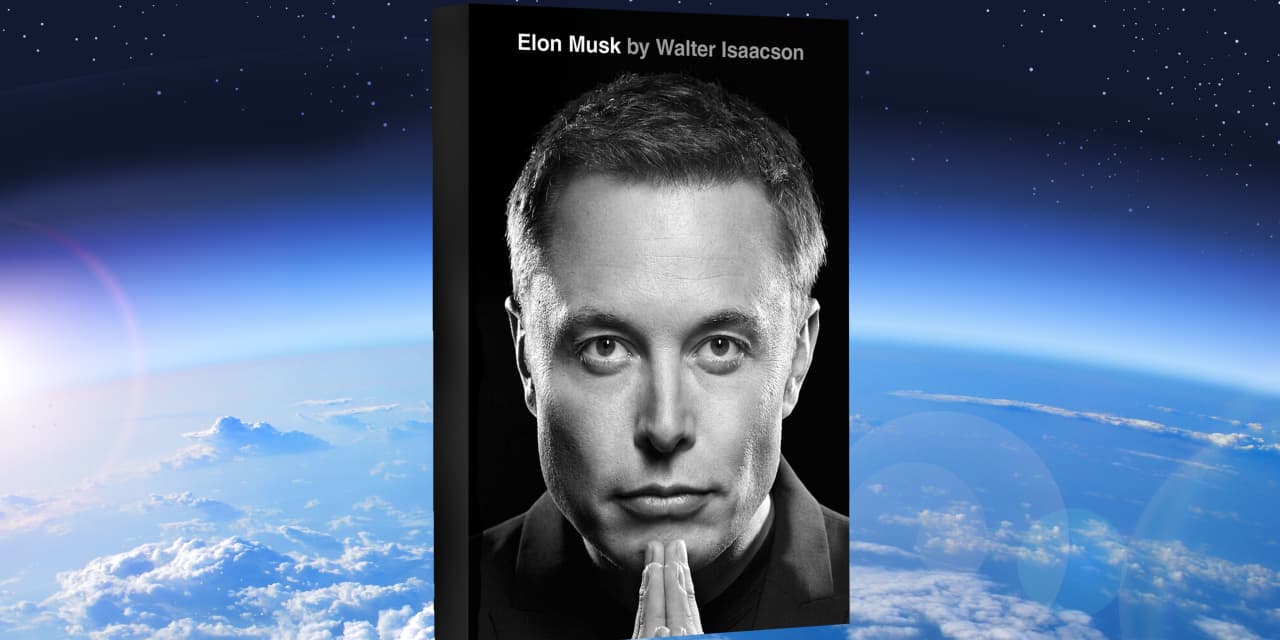“To anyone I’ve offended, I just want to say: I reinvented electric cars and I’m sending people to Mars in a rocket ship. Did you also think I was gonna be a chill, normal dude?” The famous quote from Elon Musk when he appeared on Saturday Night Live in 2021 is the leading epigraph of the tech billionaire’s latest biography “Elon Musk“.
The nearly 700-page book was written by Walter Isaacson, a veteran biographer who’s penned a series of bestsellers about figures like Albert Einstein, Benjamin Franklin, and Steve Jobs. For the Musk biography, Isaacson shadowed the richest man on earth for two years and talked to many family members, friends, and coworkers around him.
There are plenty of juicy details in the book about Musk’s unusual life from early childhood to his latest endeavor. Here are three takeaways Barron’s found particularly interesting:
Stubborn but not always
The biography illustrated Musk’s decision-making style—which Isaacson described as “oscillating between bold, stubborn, reckless, visionary, guided by the first principles of physics, but at times surprisingly flexible”—by showcasing how he approaches some of the debates within
Tesla.
Whether to use radar in self-driving cars—or solely relying on visual data from cameras—has been a contentious issue at the firm. In early 2021, Musk decided to go for a “pure vision solution” when Tesla’s in-house radar system Phoenix wasn’t working well. When some of his top engineers pushed back arguing it would be unsafe to delete radar, Musk shut them down, and some left the firm.
Still, Isaacson noted that Musk “can be brought around by evidence.” The CEO continued to allow his engineers to develop and improve Phoenix, and signed off on trying out the new system in Tesla cars. “Elon is not against radar, he’s just against bad radar,” says Lars Moravy, Tesla’s head of vehicle engineering, as quoted in the book.
Pursuit of “truth-seeking” AI
Musk has long been worried about the danger of artificial intelligence running amok and threatening humanity, which has in part led to his fallout with Google co-founder Larry Page, according to Isaacson. Musk was also unhappy about how OpenAI, a nonprofit he co-founded as a counterweight to Google’s DeepMind, has become a closed-source, for-profit company effectively controlled by
Microsoft.
Musk launched his new company xAI in July, with the claims to make AI safe for the human race. “I can’t just sit around and do nothing,” he told Isaacson during one of their conversations.
The three goals Musk assigned to his team include: An AI bot that could write computer code, a chatbot that could assure political neutrality, and the most challenging of all, a form of AI that could “reason” and “think” and pursue “truth” to make sure that human consciousness could be preserved, because “we are an interesting part of the universe,” Musk told Isaacson.
Motivated by crisis
The book also touched on Musk’s consistent desire to be in a crisis mode. “When things were most dire, he got energized. […] But when he was not in a survive-or-die mode, he felt unsettled.” This unnerving feeling has prompted Musk to “launch surges, stir up dramas, throw himself into battles he could have bypassed, and bite off new endeavors,” wrote Isaacson.
This pursuit of new battlegrounds, which coincided with a flush of cash in early 2022 from stock sales, largely drove Musk’s decision to take over Twitter, now named X, according to Isaacson. The author called the social-media platform the “ideal playground” for Musk, which rewards players who are “impulsive, irreverent, and unfiltered” and allows Musk to become “king of the schoolyard”.
Musk’s intensity and competitiveness is also manifested through his passion for videogames, which, according to Isaacson, is a way to “let off (or build up) steam and hone his technical skills and strategic thinking for business.”
In 2021, Musk became obsessed with the multiplayer strategy game Polytopia. Isaacson detailed how the billionaire spent hours playing the game, even during family gatherings and his visit to Tesla’s Berlin factory (he delayed meetings because of it). He became so good that he was able to beat the game’s developer. “I’m just wired for war, basically,” Musk told Isaacson.
Write to Evie Liu at [email protected]
Read the full article here




